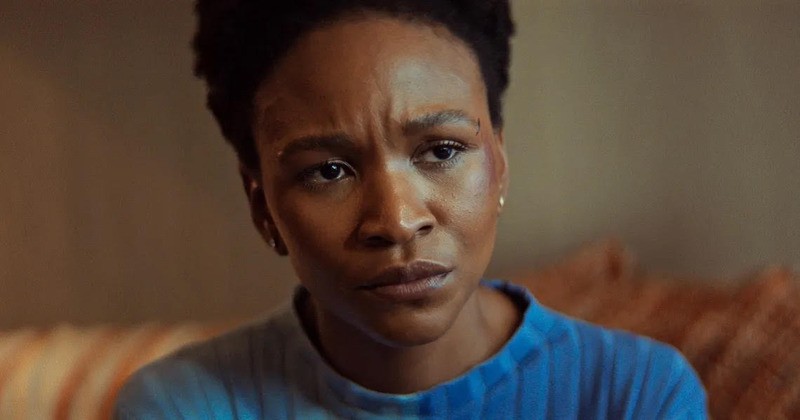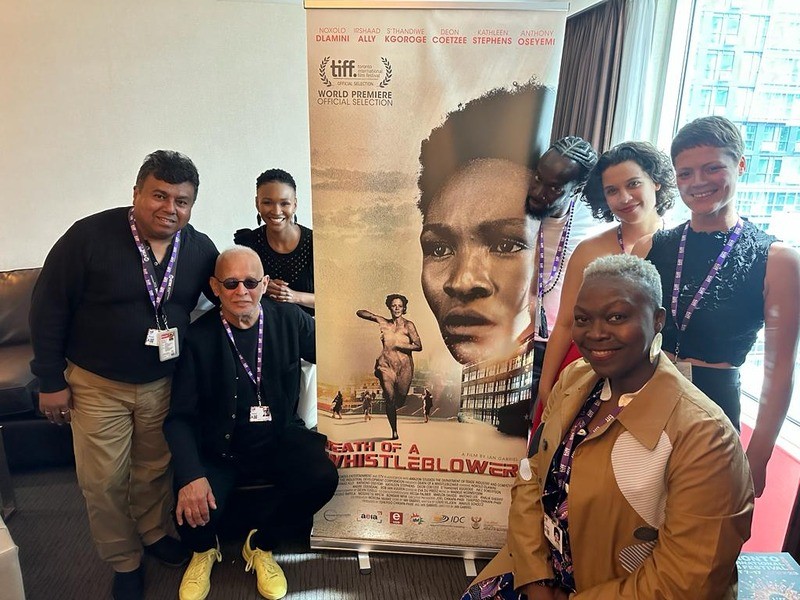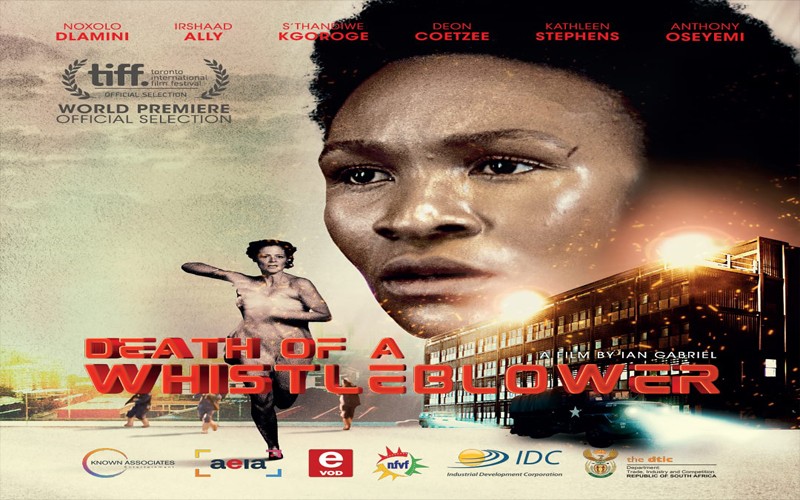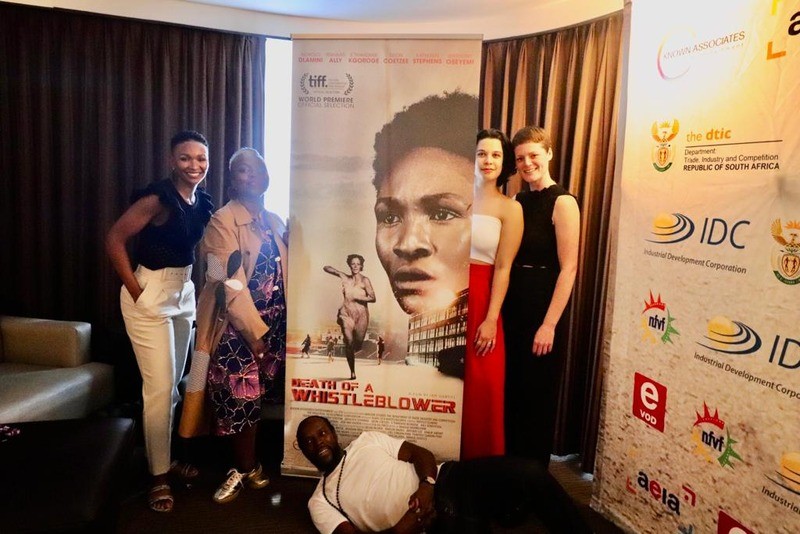 Death of a Whistleblower
Image: Known Associates Entertainment
Death of a Whistleblower
Image: Known Associates Entertainment
TIFF2023: I hope persistent search for truth will impact audiences, says South African filmmaker Ian Gabriel on 'Death of a Whistleblower'
Against the backdrop of British colonialism, tribal conflict, apartheid, and ongoing difficulties, Ian Gabriel's Death of a Whistleblower thoughtfully blends past and present to reflect South Africa's intricate legacy, while highlighting the unwavering resilience of its women. In the film investigative journalist Luyanda Masinda's life is thrown into shock when her one night lover, well known editor Stanley Galloway, is killed in front of her in a busy Johannesburg street as the political thriller highlights the devastating risks faced by South African whistleblowers. Suman Das catches up with Ian Gabriel along with the cast at the 48th edition of Toronto International Film Festival (TIFF)
Q. Your film blends history and contemporary issues seamlessly. Can you discuss your approach to maintaining this balance throughout the storytelling process?
A. The balance of South African history, where we come from, our achievements and regrets, is a driving force in the structure of the storytelling in Death of a Whistleblower. Without revealing too much of the plot, I would say this is why we look at a past crime as the trigger that sets in motion the present day investigation in Death of a Whistleblower. Also, our reflection on the challenges of the past and how we’ve dealt with this historically as a nation powers my view that the story of Death of a Whistleblower is only complete if it reflects a cross genre approach, with both a redemption approach and a revenge motif fighting for dominance in the narrative. I leave it to the viewers to decide whether redemption or revenge should predominate in the South African narrative.
 Suman Das catches up with Ian Gabriel and cast at TIFF | Photo Courtesy: Suman Das
Suman Das catches up with Ian Gabriel and cast at TIFF | Photo Courtesy: Suman Das
Q. What message or themes from "Death of a Whistleblower" do you hope will leave a lasting impact on the audience?
A. My hope is that the persistent search for the truth is the cinematic theme that will most powerfully impact audiences, both in South Africa and internationally.
Q. "Death of a Whistleblower" explores the courage of those who challenge the status quo. Are there any real-life inspirations or events that influenced the film's narrative?
A. At the end of the film, we acknowledge several South African whistleblowers. They are all listed in the postscript.
Q. Investigative journalism and whistleblowing play a significant role in the film. How do you think this film narrates the role of the media in holding the one in power accountable?
A. The role of the media is more and more significant in the present. Social media has ironically not reduced the need for other forms of media, but rather increased the need, as social media is so individual focused that broader issues are often not thoroughly dealt with, although attention is more thoroughly focused on social media gestures and claims. Only by revealing truths that affect society as a whole can we expect to hold the powerful to account.

Q. South African women's resilience is a central theme. What discussions do you hope the film sparks about gender empowerment and equality?
A. Women have always played a pivotal role in the evolution of our history in South Africa. We have a chant that goes: When you strike a woman; you strike a rock. That rock like defiance is what has pushed through important change and evolution in South Africa. Gender empowerment is essential to see issues that are family based, like health, employment and education, all to be ameliorated in the future.
Q. What was the most rewarding aspect of directing 'Death of a Whistleblower'?
A. The most rewarding aspect of directing this film was to experience with the actors the sense of empowerment that came from telling a believable story of our present and our past.
 Photo Courtesy: Suman Das
Photo Courtesy: Suman Das
Q. (To actor Anthony Oseyemi) Can you share your experiences of working together to convey the emotional depth of your characters' relationships on screen?
A. The cast and crew were fantastic and I really enjoyed working with Ian again. The work on the character (played by me) was a simple point from Ian. The character had literally seen it all, a former child soldier continuing in this line of work. He now works for a private military security company. He is calm and comfortable in his skin, he has to be understated and be lethal when called upon. He talks about facts, cause and effect, he’s not dramatic or emotional in his delivery. He understands people's types and inclinations, he’s a tracker
Top Headlines
-
Entertainment
Rani Mukerji returns as fearless cop Shivani Roy in Mardaani 3 watch Babbar Sherni song!
January 20, 2026
-
Entertainment
Bollywood 2025: Hits, Hype and Heartbreaks as Dhurandhar Redefines the Year
December 24, 2025
-
Entertainment
Rotary Club of Calcutta East Central celebrates centenary of iconic actor Santosh Dutta with statue unveiling
December 04, 2025
-
Entertainment
Valentyn Vasyanovychs To The Victory! wins 2025 TIFF Platform Award unanimously
September 26, 2025
-
Entertainment
Chlo Zhaos Hamnet Wins TIFF 2025 Peoples Choice Award
September 20, 2025
-
Entertainment
Sholay: Golden even after fifty years
July 04, 2025
-
Entertainment
War 2: Check out Hrithik Roshan, Jr NTR and Kiara Advani's new posters
June 26, 2025
-
Entertainment
LGBTQIA+: Icelandic film Odd Fish and Brazil's Baby win big at KASHISH 2025 film festival
June 12, 2025
-
Entertainment
Katrina Kaif named Maldives tourism global brand ambassador ahead of Modi's visit
June 10, 2025
-
Entertainment
'Queen marches to conquer': Deepika Padukone joins Atlee's AA22xA6 starring Allu Arjun after 'Spirit' exit
June 08, 2025


